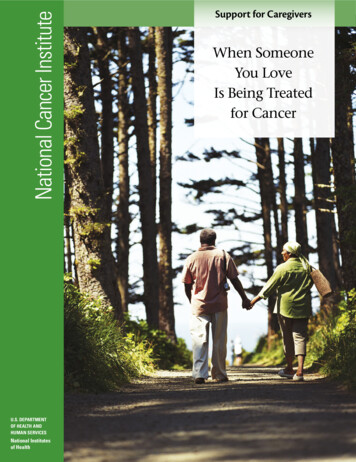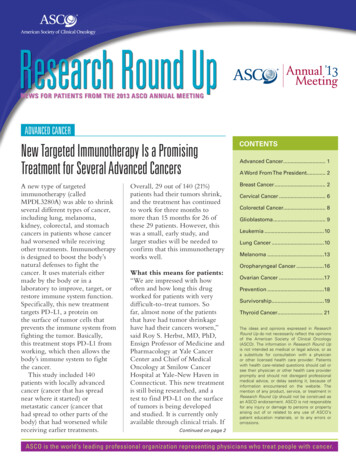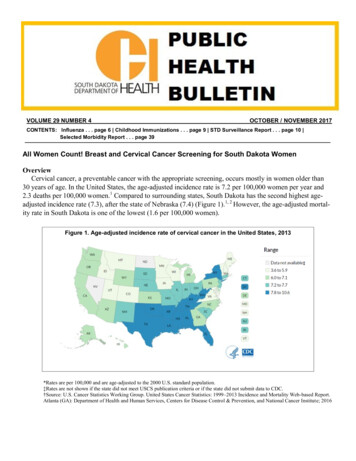
Transcription
National Cancer InstituteU.S. DEPARTMENTOF HEALTH ANDHUMAN SERVICESNational Institutesof HealthSupport for CaregiversWhen SomeoneYou LoveIs Being Treatedfor Cancer
For more information The following booklets may be helpful if your loved one isreceiving cancer treatment: Chemotherapy and You Coping With Advanced Cancer Eating Hints for Cancer Patients Taking Part in Cancer Treatment Research Studies Pain Control Radiation Therapy and You Taking Time Thinking About Complementary and Alternative Medicine When Cancer ReturnsThese booklets are available from the National CancerInstitute (NCI). To learn more about specific types ofcancer or to download any of these booklets, visit NCI’swebsite (http://www.cancer.gov). You can also call NCI’sCancer Information Service toll-free at 1-800-4-CANCER(1-800-422-6237) to speak with an information specialist.We would like to offer our sincerest gratitude to theextraordinary caregivers, health professionals, andscientists who contributed to the development andreview of this publication.
When Someone You LoveIs Being Treated for Cancer“You definitely need to learn ways to takecare of yourself. Because if you’re not takingcare of yourself, you can’t take care ofanyone else. Don’t be afraid to ask questionsand don’t be afraid to ask for help.” —Francis
The purpose of this bookis to focus on you and your needs.We’ve heard from many caregivers about things they wishthey had known early on. We have collected their tips inthis booklet. Some of the tips seem simple, but they maynot always be easy to do.Use this booklet in whatever way works best foryou. You can read it from front to back. Or you can justrefer to different sections as you need them.No two people are alike. Some chapters of thisbooklet may apply to you, while others may not. Oryou may find that some sections are more usefulto you later.Terms Used: This booklet uses the terms “loved one”and “patient” throughout to describe the person you arecaring for. In addition, for ease of reading, we alternateusing the pronouns “he” and “she” when referring to theperson with cancer.Other booklets for caregivers that can be downloadfrom the NCI website are: Facing Forward: When Someone You Love HasCompleted Cancer Treatment When Someone You Love Has Advanced Cancer When Your Parent Has Cancer: A Guide For Teens When Your Brother or Sister Has Cancer:A Guide for Teens
Table of ContentsWho Is a Caregiver? .1Adjusting to Being a Caregiver .3Caring for Your Mind, Body, and Spirit .10Talking with the Health Care Team .19Talking with Family and Friends .21Life Planning .37Reflection.40Caregiver’s Bill of Rights .41Resources .42
Who Is a Caregiver?This booklet is for you if you’re helping your loved oneget through cancer treatment. You are a “caregiver.” Youmay not think of yourself as a caregiver. You may see whatyou’re doing as something natural—taking care of someoneyou love.There are different types of caregivers. Some are familymembers, while others are friends. Every situation isdifferent. So there are different ways to give care. Thereisn’t one way that works best.There are otherbooklets available thattalk about how to givecare to a loved one.But the purpose of thisbooklet is to focus onyou and your needs.Caregiving can mean helping with day-to-day activitiessuch as doctor visits or preparing food. But it can also belong-distance, coordinating care and services for your loved one by phone or email. Caregivingcan also mean giving emotional and spiritual support. You may be helping your loved one copeand work through the many feelings that come up at this time. Talking, listening, and just beingthere are some of the most important things you can do.Giving care and support during this challenging time isn’t always easy. The natural response ofmost caregivers is to put their own feelings and needs aside. They try to focus on the person withcancer and the many tasks of caregiving. This may be fine for a short time. But it can be hard tokeep up for a long time. And it’s not good for your health. If you don’t take care of yourself, youwon’t be able to take care of others. It’s important for everyone that you give care to you.“I think you can be the best caregiver youcan be by taking care of yourself, by tryingto get as much information as possible, andby letting yourself lean on the people whoare willing to help you.” —Leneice1
2
Adjusting to Being a CaregiverChanging RolesWhether you’re younger or older, you may find yourself in a new role as a caregive . You mayhave been an active part of someone’s life before cancer, but perhaps now the way you supportthat person is different. It may be in a way in which you haven’t had much experience, or ina way that feels more intense than before. Even though caregiving may feel new to you now,many caregivers say that they learn more as they go through their loved one’s cancer experience.Common situations that they describe: Your spouse or partner may feel comfortable with only you taking care of him. Your parent may have a hard time accepting help from you (her adult child) since she’salways been used to caring for you. Your adult child with cancer may not want to rely on his parents for care. You may have health problems yourself, making it hard physically and emotionally to takecare of someone else.Whatever your roles are now, accepting thechanges may be tough. It’s very common to feelconfused and stressed at this time. If you can,try to share your feelings with other loved onesor join a support group. Or you may choose toseek help from a counselor or psychologist. Manycaregivers say that talking with a counselor helpedthem. They feel they were able to say things thatthey weren’t able to say to their loved ones. See“Talking with Family and Friends” on page 21 formore tips.“Once a week, after I takethe kids to school, I take Momto her doctor’s appointment.Then I take her home and fixher lunch and sit with herawhile. She argues with meevery time because she wantsto do it herself. It’s hard forher to have to rely on me.”Coping with Your Feelings—LynnYou’ve probably felt a range of feelings as you carefor your loved one. They can be quite strong and may come and go as you go through treatmentwith the patient. Many caregivers describe it as being “like a rollercoaster.” You may feel sad, afraid,angry, and worried. There is no right or wrong way to feel or react. These feelings are all normal.You may relate to all of the feelings on the next page, or just a few. You may feel them atdifferent times, with some days being better than others. It may help to know that othercaregivers have felt the same way that you do. One of the first steps in coping with feelings is torecognize that they exist and that having them is normal. Try to give yourself time to understandand work through your range of emotions.3
Anger. Many caregivers say they often feel angrywith themselves, their family members, or thepatient. Sometimes anger comes from feelings thatare hard to show, such as fear, panic, or worry. Orit may come from resentment of all that you’regoing through. If you can, try to avoid lashing outat others because of these emotions. Anger canbe healthy if you handle it the right way. It canhelp motivate you to take action, find out more,or make positive changes in your life. But if thesefeelings persist and you remain angry at thosearound you, seek help from a counselor or othermental health professional.“It’s emotionally exhausting,and I never know what toexpect. One minute, things arelooking up. Then a couple ofhours later, something happensand I don’t have the answers.”—DavidGrief. You may be mourning the loss of what you hold most dear—your loved one’s health orthe life you had with each other before cancer. It’s important to give yourself permission togrieve these losses. It takes time to work through and accept all the changes that are occurring.Guilt. Feeling guilty is a common reaction for caregivers. You may worry that you aren’t helpingenough, or that your work or distance from your loved one is getting in the way. You may evenfeel guilty that you’re healthy. Or you may feel guilty for not acting upbeat or cheerful. But knowthat it’s okay. You have reasons to feel upset, and hiding these feelings may keep other peoplefrom understanding your needs.Anxiety and depression. Anxiety means you have extra worry, you can’t relax, you feel tense, oryou have panic attacks. Many people worry about how to pay bills, how the cancer will affect thefamily, and of course, how their loved one is doing. Depression is a persistent sadness that lastsmore than two weeks. If any of these symptoms start affecting your ability to function normally,talk with your health care provider. Don’t think that you need to tough it out without any help.There are ways your symptoms can be eased during this hard time.Hope or hopelessness. You may feel hope or hopelessness to different degrees throughout yourloved one’s cancer treatment. And what you hope for may change over time. You may hope fora cure most of all. But you may also hope for other things, such as comfort, peace, acceptance,and joy. If you’re not able to get rid of a feeling of hopelessness, talk to a trusted family member,friend, health provider, or spiritual or faith leader. As a caregiver, feelings of hope can get youthrough the next 5 minutes or the next 5 days.Loneliness. You can feel alone in your“There are times when you don’tknow how to help. You can’t takeaway the pain. You can’t takeaway the frustration. All you cando is be there, and it’s a veryhelpless feeling.” —Cecile4role as a caregiver, even if you have lotsof people around you. It’s easy to feel likeno one understands what you’re goingthrough. You may feel lonely because youhave less time to see people and do thingsthat you used to. Whatever your situation,you aren’t alone. Other caregivers shareyour feelings. See page 12 for ways toconnect with others.
Other Ways to CopeLet go of mistakes. You can’t be perfect. No one is. Thebest we can do is to learn from our mistakes and move on.Continue to do the best you can. And try not to expect toomuch from yourself.Cry or express your feelings. You don’t have to be upbeat allthe time or pretend to be cheerful. Give yourself time to copewith all the changes you’re going through. It’s okay to cry andshow that you are sad or upset.Put your energy into the things that matter to you. Focus on the things you feel are worthyour time and energy. Let the other things go for now. For example, don’t fold the clothes whenyou’re tired. Go ahead and take time to rest.Understand where anger comes from. Your loved one may get angry with you. It’s verycommon for people to direct their feelings at those who are closest. Their stress, fears, andworries may come out as anger. Try not to take it personally. Sometimes patients don’t realize theeffect their anger has on others. So it may help to share your feelings with them when they’recalm. Try to remember that the anger isn’t really about you.Forgive yourself. This is one of the most important things you can do. Chances are that youare doing what you can at this moment. Each new moment and day gives you a new chance totry again.Knowing Your Strengths and LimitsOne way that caregivers cope is to focus their energy on things they can control. This can mean: Helping schedule doctor visits Helping with daily needs such as meals and errands Taking on your loved one’s tasks Learning more about cancer andtreatment options Doing whatever else you can doMany caregivers say that, looking back, they took ontoo much themselves. Or they wish they had askedfor help sooner. Take an honest look at what youcan and can’t do. What things do you need or wantto do yourself? What tasks can you give to or sharewith others? Be willing to let go of things that aren’tessential for you to do.“Growing up, we weretaught two rules. Oneis, ‘Don’t sweat thesmall stuff.’ And second,‘Everything is small stuff.’And you have to decidewhat’s important to you.Focus on what you cando, not what you can’t.”—James5
Setting Your PrioritiesMake a list of your weekly tasks and activities. Figureout how much time you spend on each one and howimportant it is. Scratch things off your to-do list if theyaren’t important. That will give you more time for thethings you really want and need to do. This may meandisappointing someone else. But you need to take careof what’s important to you, regardless of what othersmay think. Most people will understand if you tellthem what is going on.Why Getting Help Is Important“You have to learn that ifpeople offer, let them dosomething. Ask for whatyou need, because theydon’t know. You have tobe willing to let go of yourpride and let them helpyou.” —ChevonneAccepting help from others isn’t always easy. When tough things happen, many people tend topull away. They think, “We can handle this on our own.” But things can get harder as the patientgoes through treatment. You may need to change your schedule and take on new tasks. As aresult, many caregivers have said, “There’s just too much on my plate.”Remember that getting help for yourself can also help your loved one because: You may stay healthier. Your loved one may feel less guilty about all the things that you’re doing. Some of your helpers may offer time and skills that you don’t have.How Can Others Help You?Would you find it helpful if someone made dinner for you or ran some of your errands? If so, yomay benefit from having people help with tasks you don t have time to do.People want to help, but many don’t know what you need or how to offer it. It’s okay for you totake the first step. Ask for what you need and for the things that would be most helpful to you.For example, you may want someone to: Help with household chores, such ascooking, cleaning, shopping, yard work,and childcare or eldercare Talk with you and listen to your feelings Drive your loved one to appointments Pick up a child from school or activities Set up a website where people can find outwhat support you need or receive updateson your loved one Look up information that you need Be the contact person and help keep othersupdated on your loved one’s situation6
Who Can Help?Think about people who can help you with tasks. Think of all the people and groups you know,including family, friends, neighbors, and coworkers. Members of your faith community, civicgroups, and associations may also be able to help. The hospital or cancer center may also be ableto tell you about services they offer, or have a list of agencies to call.Finding Respite HelpRespite (RES-pit) helpers spend time with your loved one. They can be paid or may volunteertheir time. Many caregivers say they wish they had gotten respite help sooner. It can leave youfree to rest, see friends, run errands, or do whatever you’d like to do. Respite caregivers canalso help with physical demands, such as lifting the patient into a bed or a chair. If this serviceappeals to you, you may want to: Talk with your loved one about having someonecome into your home to help out from timeto time. Get referrals from friends, health care professionals,or your local agency on aging. Ask respite helpers what types of tasks they do.You can get respite help from family and friends, butalso government agencies or nonprofit groups. Whateveryou do, remember that it isn’t a failure on your part as acaregiver if you need some help and time to yourself.Be Prepared for Some People to Say No“We’ve gotten lots ofsupport, and some of itcomes from people weexpected it from. But alot has come from thosewe don’t know very well.And others we do knowwell have stayed away.You just never knowwith people.” —JessieSometimes people may not be able to help. This mayhurt your feelings or make you angry. It may be especially hard coming from people that youexpected help from. You might wonder why someone wouldn’t offer to help you. Some commonreasons are: Some people may be coping with their own problems, or a may not have the time. They are afraid of cancer or may have already had a bad experience with cancer. They don’twant to get involved and feel pain all over again. Some people believe it’s best to keep a distance when people are struggling. Sometimes people don’t realize how hard things really are for you. Or they don’t understandthat you need help unless you ask them for it directly. Some people feel awkward because they don’t know how to show they care.If someone isn’t giving you the help you need, you may want to talk to them and explain yourneeds. Or you can just let it go. But if the relationship is important, you may want to tell theperson how you feel. This can help prevent resentment or stress from building up. These feelingscould hurt your relationship in the long run.7
Tips on How to Ask for HelpRoadblock“His cancer is a privatething. I’d have to tellpeople about it to getany support.”What Others Have DoneYou and your loved one can decide who to tell, what totell them, and when and how. Some options are to: Tell only a few people close to you for now. Limit specifics about what you share. You can say,“He’s sick,” or “She isn’t feeling well today.” Ask another family member, friend, or member ofyour faith or spiritual community to share the news. Get help from services or agencies in your area insteadof from people you know.“Everyone has a lotgoing on. I don’t wantto bother them or putthem out.”If you’re worried about being a burden to others, here aresome things to think about: Many people probably want to help. If you let more people help, it can ease your workload. Would you want to help someone else who was in asimilar situation? Would you mind if they asked youto lend a hand?“I can’t explain it, butI just don’t feel up toreaching out right now.”Many people don’t want support when they need itmost. You may often back away from your regular sociallife and from people in general. You may feel that it’s justtoo much work to ask for help.Talk with someone you trust, such as a friend, member ofyour faith community, or counselor. This person can helpyou sort out your thoughts and feelings. They can alsohelp you find ways to get support.“It’s my duty to takecare of my family, notsomeone else’s.”8Having a support system is a way of taking care of yourfamily. Giving some tasks to others lets you focus onthose that you feel you should do yourself.
Long-Distance CaregivingIt can be really tough to be away from a loved one who has cancer. You may feel like you’rea step behind in knowing what is happening with her care. Yet even if you live far away, it’spossible for you to give support and be a problem-solver and care coordinator.Caregivers who live more than an hour away from their loved ones most often rely on thetelephone or email as their communication link. But using these to assess someone’s needs canbe limiting. Aside from true medical emergencies, long-distance caregivers are faced with judgingwhether situations can be dealt with over the phone or require an in-person visit.Finding ContactsMany long-distance caregivers say that it helps to exploreboth paid and volunteer ways to provide support. Try tocreate a support network of people who live near yourloved one whom you could call day or night in a crisisor just to check in. You could also look into volunteervisitors, adult day care centers, or meal delivery servicesin the area. Having a copy of the local phone book foryour loved one’s area or a list of websites can also giveyou quick access to resources. Share a list of home, work,and cell phone numbers with the health care team andothers in case of an emergency.Other Tips Ask a local family member or friend to updateyou daily by email. Or, consider creating a Website to share news about your loved one’s conditionand needs.“Our family is spreadthroughout the U.S., so it’shard to have a hands-onexperience. But the phonecalls have increased, withthem calling to say, ‘I loveyou, and what can I do foryou?’ Even though thereisn’t much they can do tohelp me with Mom, just tohave them call more hasmade it a little better.”—Patty Talk to electronic or computer experts to find out about other ways to connect with people.New advances using video and the Internet are being made every day. Airlines or bus lines may have special deals for patients or family members. The hospitalsocial worker may also know of other resources, such as private pilots or companies that helppeople with cancer and their families. If you are traveling to see your loved one, time your flights or drives so that you have timeto rest when you return. Many long-distance caregivers say that they don’t allow themselvesenough time to rest after their visits. Consider getting a phone card from a discount store to cut down on long-distance bills. Or,review your long-distance and cell phone plans. See if you can make any changes that wouldreduce your bills.9
Caring for Your Mind, Body, and SpiritMake Time for YourselfYou may feel that your needs aren’t important right now. Or maybe by the time you’ve takencare of everything else you have to do, there’s no time left for yourself. Or you may feel guiltythat you can enjoy things that your loved one can’t right now.Most caregivers say they have those same feelings. But caring for your own needs, hopes, anddesires is important to give you the strength to carry on. (See the Caregiver’s Bill of Rights onpage 41.)Taking time to recharge your mind, body, and spirit can help you be a better caregiver. You maywant to think about: Finding nice things you can do for yourself—even just a few minutes can help Cutting back on personal activities, rather than cutting them out entirely Finding things others can do or arrange for you, such as appointments or errands Looking for easy ways to connect with friends Finding larger chunks of “off-duty” timeMyths About Taking Care of Yourself *MythFact“Taking care of myselfmeans that I have to beaway from my loved one.”You can do things to take care of yourself with orwithout your loved one in the room with you. What’simportant is that you do not neglect yourself.“Taking care of myselftakes a lot of time awayfrom other things.”Some self-care takes only a few minutes, such asreading an upbeat passage from a book. Other selfcare can be done in moments between longer tasks.“I’d have to learn howto focus on myself. I don’tknow if I can start.”Whenever things make you feel happier, lighter,more relaxed, or more energized, these count astaking care of yourself. Think of things that youalready know work for you.* The Hospice of the Florida Suncoast. Caring For Yourself While Caring For Others, Adapted with permission.10
Ways to Nurture Yourself“I just need some quiettime. If my husband’sTake Stock of Your Own FeelingsGiving yourself an outlet for your own thoughts andfeelings is important. Think about what would helplift your spirits. Would talking with others help easeyour load? Or would you rather have quiet time byyourself? Maybe you need both, depending on what’sgoing on in your life. It’s helpful for you and othersto know what you need.taking a nap, I will reada book or sit on the porchbecause sometimes it’sso intense. We have dayswhere we go straight fromchemo to radiation. It canbe very tiring.” —AdeleFind ComfortYour mind needs a break from the demands of caregiving. Think about what gives you comfortor helps you relax. Caregivers say that even a few minutes a day without interruptions helpsthem to cope and focus.Take 15–30 minutes each day to do something for yourself, no matter how small it is. (“See SmallThings I Can Do for Me” on page 12.) For example, caregivers often find that they feel less tiredand stressed after light exercise. Try to make time for taking a walk, going for a run, or doinggentle stretches.You may find that it s hard to relax evenwhen you have time for it. Some caregiversfind it helpful to do exe cises designed tohelp you relax, such as stretching or yoga.Other relaxing activities include taking deepbreaths or just sitting still.11
Small ThingsI Can Do for MeEach day, take some time todo something for yourself, nomatter how small it is. Thismight include: Napping Exercising or yoga Keeping up with a hobby Taking a drive Seeing a movie Working in the yard Going shopping Catching up on phonecalls, letters or emailYou may find that it’s hard torelax even when you have timefor it. Some caregivers find ithelpful to do exercises such asdeep breathing or meditating.Join a Support GroupSupport groups can meet inperson, by phone, or over“What I need atthe Internet. They may helpleast once or twiceyou gain new insights intowhat is happening, get ideasa week is to talkabout how to cope, and helpto one person oryou know that you’re nota group of peoplealone. In a support group,people may talk about theirwho are in thefeelings, trade advice, andsame shoes astry to help others who areI am.” —Vincedealing with the same kindsof issues. Some people liketo go and just listen. Andothers prefer not to join support groups at all. Some peoplearen’t comfortable with this kind of sharing.If you can’t find a group in your area, t y a support groupon the Internet. Some caregivers say websites with supportgroups have helped them a lot.Talk to a CounselorYou may be feeling overwhelmed and feel like talkingto someone outside your inner circle of support. Somecaregivers find it helpful to talk to a counselo , socialworker, psychologist or other mental health professional.Others also find it helpful to turn to a leader in their faithor spiritual community. All may be able to help you talkabout things that you don’t feel you can talk about withyour loved one or others around you. You also might findways of expressing your feelings and learn ways of copingthat you hadn’t thought of before.Connect with Your Loved OneCancer may bring you and your loved one together morethan ever before. Often people become closer as they facechallenges together. If you can, take time to share specialmoments with one another. Try to gain strength from allyou are going through together, and what you have dealtwith so far. This may help you move toward the futurewith a positive outlook and feelings of hope.12
Connect with OthersStudies show that connecting with other people isvery important to most caregivers. It’s especiallyhelpful when you feel overwhelmed or want to saythings that you can’t say to your loved one. Try tofind someone you can really open up to about yourfeelings or fears. You may find it helpful to talk withsomeone outside the situation. Also, it may help tohave an informal network of people to contact, eitherby phone or in person. But if you’re concerned abouta caregiving issue, you may want to talk with yourloved one’s doctor. Knowledge can help reduce fears.“It’s okay for a neighborto ask how I’m doingwhen they want theanswer to be, ‘I’m fine.’But when I’m really notfine, all I need is to talkto someone who canunderstand, or just hearme out. You don’t have tohave an answer, just listenLook for the Positiveto me.” —KathyIt can be hard finding positive moments when you’rebusy caregiving. It can also be hard to adjust to your role as a caregiver. Caregivers say thatlooking for the good things in life helps them feel better. Once a day, think about something thatyou find rewarding about caregiving, such as gratitude you’ve received, or extra support from ahealth care provider. You might also take a moment to feel good about anything else from theday that is positive—a nice sunset, a hug, or something funny that you heard or read.Let Yourself LaughIt’s okay to laugh, even when your loved one is intreatment. In fact, it’s healthy. Laughter releasestension and makes you feel better. You can readhumor columns, watch comedy shows, or talk withupbeat friends. Or just remember funny things thathave happened to you in the past. Keeping yoursense of humor in trying times is a good coping skill.Write in a JournalResearch shows that writing or journaling can helprelieve negative thoughts and feelings. And it may actually help improve your own health. Youcan write about any topic. You might write about your most stressful experiences. Or you maywant to express your deepest thoughts and feelings. You can also write about things that makeyou feel good, such as a pretty day or a kind coworker or friend.Another technique people use is to write down whatever comes to mind. It doesn’t have to makesense or have correct grammar. It just helps to get all the “jumble” out of your mind and ontothe paper.13
Be ThankfulYou may feel thankful that you can be there for your loved one. You may be glad for a chanceto do something positive and give to another person in a way you never knew you could.Some caregivers feel that they’ve been given the chance to build or strengthen a relationship.This doesn’t mean that caregiving is easy. But finding meaning in caregiving can make iteasier to manage.Do Your Usual ActivitiesIf you can, try to keep doing some of your regular activities. Studies show that not doing thoseactivities increases the stress you feel. Keep it simple and stick with things you do well. Be willingto change your routines. You may have to do things at a different time of day or for less timethan you do normally.Learn More About Can
loved one’s cancer treatment. And what you hope for may change over time. You may hope for a cure most of all. But you may also hope for other things, such as comfort, peace, acceptance, and joy. If you’re not able to get rid of a feeling of hopelessness, talk to a trusted family membe










